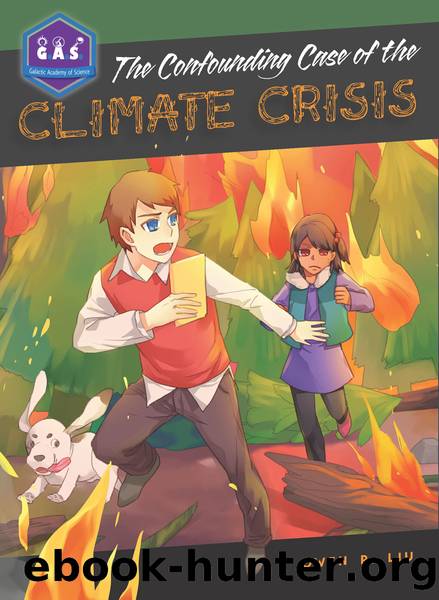The Confounding Case of the Climate Crisis by Owen R. Liu

Author:Owen R. Liu
Language: eng
Format: epub
Publisher: Tumblehome Learning, Inc.
Published: 2014-01-15T00:00:00+00:00
âTime to eat!â said Hasan, jumping up. âMy mother cooks very good meals.â The group splashed out of the water and left the basket at the shore as Hasan and Rifat led the way to their house.
Mrs. Hamid welcomed the teenagers into the house, scolding at their wet clothes and gasping when they related the story of the crocodile. But she took it in stride, smoothing Rifatâs black hair and smiling and nodding at Anita. She showed them to seats at a long table outside the back door of the house. As the late afternoon light dimmed over the village river, Mrs. Hamid brought out platters of omelet with chili and green peppers, and a savory bowl of squash, rice, and spices that she named vegetable tehari, with onions, cardamom and cloves.
âI hope you will not find this food too hot for you. I am told Bangladesh food is perhaps the hottest in the world, so I used fewer peppers than usual.â
âI love spicy food,â said Anita, but a moment later she gulped and fanned her tongue as sweat rolled down her temples.
âOh dear,â said Mrs. Hamid, handing each of them a small glass of water. âWould you like a simple omelet instead?â Anita and Benson looked at her guiltily, and she just smiled and disappeared back into the kitchen.
As they ate, they talked to Mr. Hamid. âHow much does it rain every year?â Benson asked.
âSometimes more, sometimes less, Allah, Allah. His ways are mysterious. Sometimes one meter, sometimes five. Some years are more dangerous than others.â
âAre there other ways to fight the floods, besides growing vegetables in the gardens?â asked Benson.
âIn some places they are building concrete levees along the riverbanks,â said Mr. Hamid.
Rifat jumped in and described new jobs he was training for in school. Computers, for example, were being used to project weather reports out into rural areas. Even if they ended up simply written on a big board, people still received warnings of floods and storms earlier.
Another job was learning to harvest rainwater for the town.
âYou need more water?â cried Benson in amazement.
Hasan lifted his water glass and swirled it around. âWe have too much water, but we canât drink it. Water flows in from the sea and contaminates our river water with salt. No one should drink salt water.â
âAnd when the rains flood the towns,â Rifat added, âwastes overflow from latrines and sewers, and contaminated water can even flow into our wells. If we drink it weâll all get sick. So yes, itâs a challenge to find safe, fresh water. But look over there.â He pointed to a structure a hundred yards away, where a metal tube poked up fifteen feet from the ground. A ladder ran up the side of the tube. âThatâs one of our tube wells. The opening is so high the river will never overflow into it. So we climb up high to reach down low for our water.â
Hasan disappeared for several minutes and then returned pulling a new rolling water wheel he had just built for his mother.
Download
This site does not store any files on its server. We only index and link to content provided by other sites. Please contact the content providers to delete copyright contents if any and email us, we'll remove relevant links or contents immediately.
Stroud, Jonathan - Lockwood & Company 01 - The Screaming Staircase by Stroud Jonathan(325)
Artemis Fowl (4) and the Opal Deception by Eoin Colfer(273)
H.I.V.E. 9: Bloodline by Mark Walden(222)
Model Suspect by Carolyn Keene(209)
Dangerous Plays by Carolyn Keene(196)
Thad, the Ghost, and Me by Margaret Peterson Haddix(193)
Carnival of the Hunted by Kieran Larwood(177)
The Witch's Curse by Keith McGowan(174)
Miss Pettigrew's Summer School for Exceptional Magical Children by P.N. Garlick(171)
Eat Your Poison, Dear (Sebastian Barth Mysteries) by James Howe(168)
Tokyo Girl by Brian Harvey(157)
Perfect Cover by Carolyn Keene(157)
Identity Revealed by Carolyn Keene(152)
Trails of Treachery by Carolyn Keene(152)
Seeing Green by Carolyn Keene(150)
Trade Wind Danger by Carolyn Keene(150)
The Man of Steel by Steve Korté(147)
Secret Identity by Carolyn Keene(143)
The Plucker by Anna Starobinets(142)
